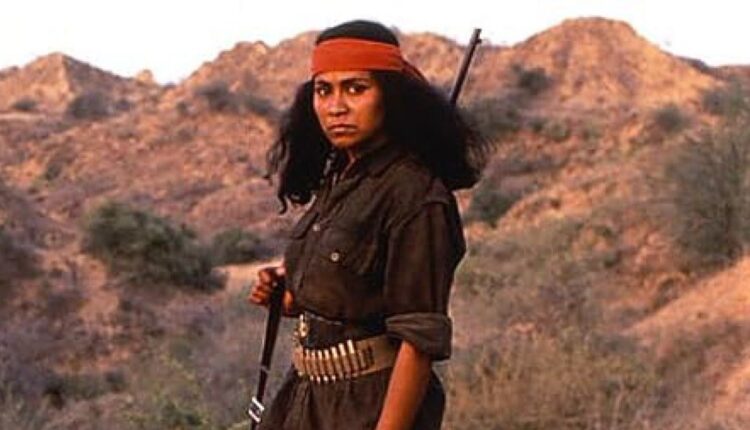Once in a while, a film based on a real-life subject turns out to be more compelling than life itself. If Shekhar Kapoor had never made another film—and if Seema Biswas had never acted in another—Bandit Queen would still have ensured their immortality.
Put simply, this is the film that put Hindi cinema on the world map. Brutal, honest, searing, and haunting, its raw intensity renders other similar gut-level Indian films almost redundant.
From the opening montage of the amazing little Sunita Bhatt being forcibly married to an unfeeling brute, to her initiation into a life of subversion, crime, and outlawry, the remarkable and disturbing story of Phoolan Devi comes alive like no other biographical film in Indian cinematic history.
At times, Kapoor’s chronicle feels like a documentary. The harsh glare of the noonday sun as it beats down on the bandits in the Chambal ravines seems to suggest a direct link between nature and man-made cruelty. There’s no shortage of brutality in Bandit Queen. So much so that one begins to wonder if cinema—with its inherently escapist framework—is even suited to portray such unrelenting bleakness, where caste and gender combine to drastically diminish a person’s very humanity.
And yet, Kapoor extracts poetry from anguish. The rage that builds within Phoolan as she is repeatedly and mercilessly raped—emotionally and physically—by marauders from both the socially “respectable” and outlawed strata of society, becomes a collective cry of humiliation and pain.
Based on a screenplay by Mala Sen, Bandit Queen spares us none of the gruesome, gut-churning details of Phoolan Devi’s life. Though the film drew commercial attention for the nude sequence where Phoolan is stripped by upper-caste tormentors and paraded through her village, Kapoor strips the act of all sensuality. Sex here is never sexy. It is domination, degradation, and violence—stripped of romance and framed as man’s subjugation of woman.
The few tender moments between Phoolan and her lover (played by the late Nirmal Pandey) are filmed with a sense of emotional caution, almost like a predator sizing up a rare pause in the hunt. The film itself moves like a prowl, where every human being is fair game—unless they learn the brutal art of survival.
Seema Biswas brings an intuitive, animalistic grace to her role. Her Phoolan is more than a performance—it’s a visceral slice of life, pinned to the screen to announce the brutal truth of caste, class, and gender realities at the grassroots.
By definition, high art is often seen as something elevating. But Bandit Queen doesn’t fit that description. It is too grim, too grave in its socio-political resonances to be uplifting. And yet, it contains within it a rare spark—a flash of cinematic genius that survives the darkness.
The film’s strong language and content drew severe censorial flak. But it isn’t the gaalis that make Kapoor’s depiction of caste and gender prejudice so unsettling. It’s the raw, unflinching honesty of his vision.
The real Phoolan Devi disowned the film, accusing Kapoor of distorting her story. But Seema Biswas’s Phoolan seems more emotionally authentic than the woman herself. Perhaps that’s the great paradox of art—its reflections can sometimes feel more resonant than the original.
The role was originally offered to the astounding Mita Vashisht, but it is now synonymous with Seema Biswas. Nothing she did before or after ever matched the unfiltered power and quiet fury of this performance.
Looking at Biswas on screen, the real Phoolan Devi might have thought, That isn’t me… but I wish it was.
ALSO READ: Vedang Raina On Being Compared With Ahaan Panday: ‘I’m Very Happy For This Success’

